罗拉德.里根第二任就职演讲
里根总统最后一次演说里根演讲
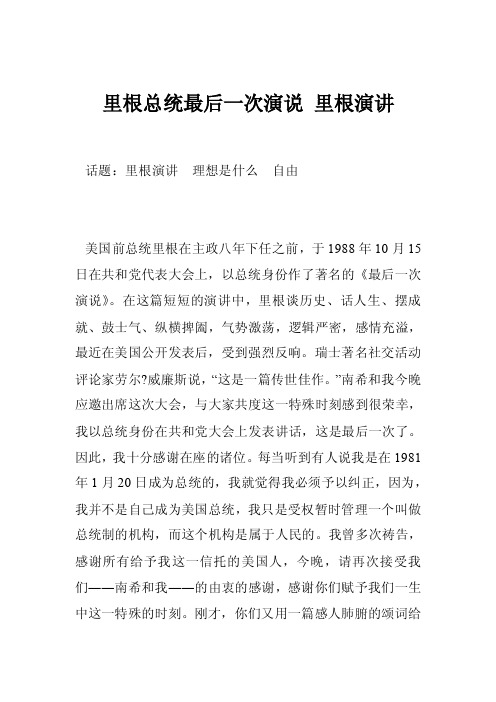
里根总统最后一次演说里根演讲话题:里根演讲理想是什么自由美国前总统里根在主政八年下任之前,于1988年10月15日在共和党代表大会上,以总统身份作了著名的《最后一次演说》。
在这篇短短的演讲中,里根谈历史、话人生、摆成就、鼓士气、纵横捭阖,气势激荡,逻辑严密,感情充溢,最近在美国公开发表后,受到强烈反响。
瑞士著名社交活动评论家劳尔?威廉斯说,“这是一篇传世佳作。
”南希和我今晚应邀出席这次大会,与大家共度这一特殊时刻感到很荣幸,我以总统身份在共和党大会上发表讲话,这是最后一次了。
因此,我十分感谢在座的诸位。
每当听到有人说我是在1981年1月20日成为总统的,我就觉得我必须予以纠正,因为,我并不是自己成为美国总统,我只是受权暂时管理一个叫做总统制的机构,而这个机构是属于人民的。
我曾多次祷告,感谢所有给予我这一信托的美国人,今晚,请再次接受我们――南希和我――的由衷的感谢,感谢你们赋予我们一生中这一特殊的时刻。
刚才,你们又用一篇感人肺腑的颂词给这种荣誉锦上添花,我只不过是个普通人,因此听到别人称赞我们取得的成就,也不免有点沾沾自喜。
但是今晚,我们首先要记住,真正值得称颂的是2亿4千5百万美国公民,是他们构成了我国宪法开宗明义的头四个字,也是最伟大的四个字:我们人民。
美国人民承受过巨大的挑战,把我们从民族灾难的深渊中拯救出来,建立了我们强大的经济实力,重振了我国在国际上的声誉,他们是出类拔萃的人,也就是人们所说的美国人。
所以,如果今晚要向谁表示敬意的话,那就应该向遍布这块土地的英雄豪杰们致敬,他们是实干家、梦想家和新生活的建设者。
没有他们,我们在民主制度下的光辉实践就将一事无成。
最近,我们常听到有人说现在是改革的时代了。
女士们、先生们,我再善意地提醒一下,我们就代表着改革。
我们从1981年1月起就卷起袖子大干起来,我们满怀希望,从不灰心丧气,我们向过去失败的政策挑战,因为我们相信,一个社会所以伟大,并不在于其政府作出多少许诺,而仅仅在于其人民取得了进步,这就是我们进行的改革。
里根1964年著名的讲演《抉择的时刻》
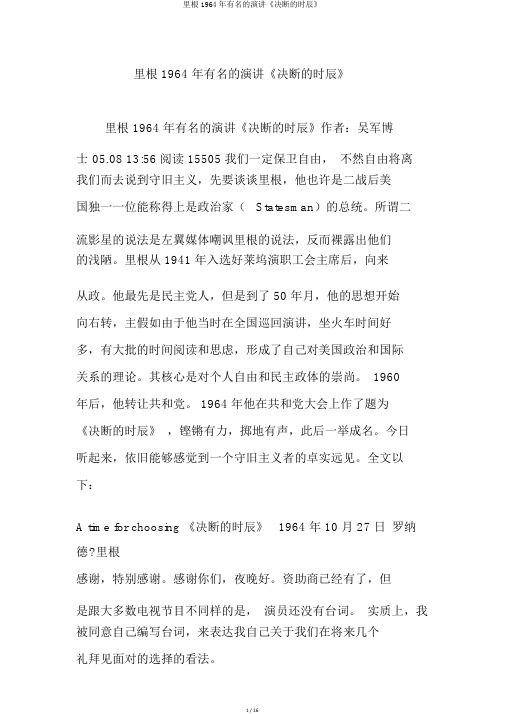
里根 1964 年有名的演讲《决断的时辰》里根 1964 年有名的演讲《决断的时辰》作者:吴军博士05.08 13:56 阅读 15505 我们一定保卫自由,不然自由将离我们而去说到守旧主义,先要谈谈里根,他也许是二战后美国独一一位能称得上是政治家( Statesman)的总统。
所谓二流影星的说法是左翼媒体嘲讽里根的说法,反而裸露出他们的浅陋。
里根从 1941 年入选好莱坞演职工会主席后,向来从政。
他最先是民主党人,但是到了 50 年月,他的思想开始向右转,主假如由于他当时在全国巡回演讲,坐火车时间好多,有大批的时间阅读和思虑,形成了自己对美国政治和国际关系的理论。
其核心是对个人自由和民主政体的崇尚。
1960年后,他转让共和党。
1964 年他在共和党大会上作了题为《决断的时辰》,铿锵有力,掷地有声,此后一举成名。
今日听起来,依旧能够感觉到一个守旧主义者的卓实远见。
全文以下:A time for choosing 《决断的时辰》1964 年 10 月 27 日罗纳德?里根感谢,特别感谢。
感谢你们,夜晚好。
资助商已经有了,但是跟大多数电视节目不同样的是,演员还没有台词。
实质上,我被同意自己编写台词,来表达我自己关于我们在将来几个礼拜见面对的选择的看法。
我的职业生涯中大多数时间都是一个民主党人,而近来我为自己选择了另一条道路。
我相信这个问题向来在困扰着两个党派。
此刻,竞选阵营中的一方告诉我们,此次竞选中的问题是保持和平易繁华,并且使用了这句话“我们从未这样的和平易繁华” 。
但是我有一种不祥之感,我们其实不可以把对将来的希望寄望在当前这样的繁华之上。
历史上没有任何一个国家能够在税赋达到全国收入三分之一的状况下生计。
今日,这个国家的每一美元收入中,有 37 美分落入税务局的腰包,而我们的政府每日的支出要比收入多1700 万美元。
过去 34 年里, 28 年的估算未能持平。
我们在过去一年中三次提升债务上限,现在我们国家的债务是世界上全部其余国家债务总和的 1.5 倍。
里根总统演讲中英文
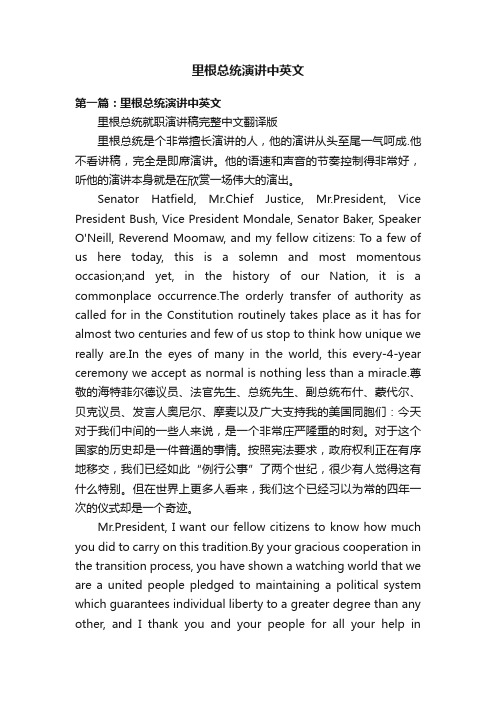
里根总统演讲中英文第一篇:里根总统演讲中英文里根总统就职演讲稿完整中文翻译版里根总统是个非常擅长演讲的人,他的演讲从头至尾一气呵成.他不看讲稿,完全是即席演讲。
他的语速和声音的节奏控制得非常好,听他的演讲本身就是在欣赏一场伟大的演出。
Senator Hatfield, Mr.Chief Justice, Mr.President, Vice President Bush, Vice President Mondale, Senator Baker, Speaker O'Neill, Reverend Moomaw, and my fellow citizens: To a few of us here today, this is a solemn and most momentous occasion;and yet, in the history of our Nation, it is a commonplace occurrence.The orderly transfer of authority as called for in the Constitution routinely takes place as it has for almost two centuries and few of us stop to think how unique we really are.In the eyes of many in the world, this every-4-year ceremony we accept as normal is nothing less than a miracle.尊敬的海特菲尔德议员、法官先生、总统先生、副总统布什、蒙代尔、贝克议员、发言人奥尼尔、摩麦以及广大支持我的美国同胞们:今天对于我们中间的一些人来说,是一个非常庄严隆重的时刻。
对于这个国家的历史却是一件普通的事情。
林肯第二次就职演说
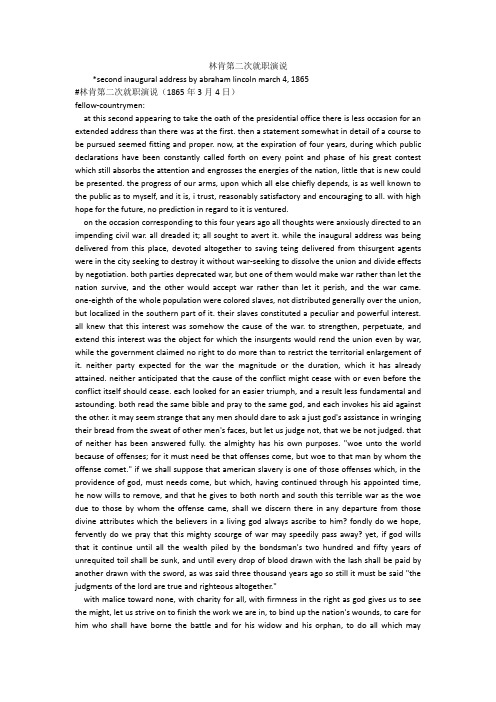
林肯第二次就职演说*second inaugural address by abraham lincoln march 4, 1865#林肯第二次就职演说(1865年3月4日)fellow-countrymen:at this second appearing to take the oath of the presidential office there is less occasion for an extended address than there was at the first. then a statement somewhat in detail of a course to be pursued seemed fitting and proper. now, at the expiration of four years, during which public declarations have been constantly called forth on every point and phase of his great contest which still absorbs the attention and engrosses the energies of the nation, little that is new could be presented. the progress of our arms, upon which all else chiefly depends, is as well known to the public as to myself, and it is, i trust, reasonably satisfactory and encouraging to all. with high hope for the future, no prediction in regard to it is ventured.on the occasion corresponding to this four years ago all thoughts were anxiously directed to an impending civil war. all dreaded it; all sought to avert it. while the inaugural address was being delivered from this place, devoted altogether to saving teing delivered from thisurgent agents were in the city seeking to destroy it without war-seeking to dissolve the union and divide effects by negotiation. both parties deprecated war, but one of them would make war rather than let the nation survive, and the other would accept war rather than let it perish, and the war came. one-eighth of the whole population were colored slaves, not distributed generally over the union, but localized in the southern part of it. their slaves constituted a peculiar and powerful interest. all knew that this interest was somehow the cause of the war. to strengthen, perpetuate, and extend this interest was the object for which the insurgents would rend the union even by war, while the government claimed no right to do more than to restrict the territorial enlargement of it. neither party expected for the war the magnitude or the duration, which it has already attained. neither anticipated that the cause of the conflict might cease with or even before the conflict itself should cease. each looked for an easier triumph, and a result less fundamental and astounding. both read the same bible and pray to the same god, and each invokes his aid against the other. it may seem strange that any men should dare to ask a just god's assistance in wringing their bread from the sweat of other men's faces, but let us judge not, that we be not judged. that of neither has been answered fully. the almighty has his own purposes. "woe unto the world because of offenses; for it must need be that offenses come, but woe to that man by whom the offense comet." if we shall suppose that american slavery is one of those offenses which, in the providence of god, must needs come, but which, having continued through his appointed time, he now wills to remove, and that he gives to both north and south this terrible war as the woe due to those by whom the offense came, shall we discern there in any departure from those divine attributes which the believers in a living god always ascribe to him? fondly do we hope, fervently do we pray that this mighty scourge of war may speedily pass away? yet, if god wills that it continue until all the wealth piled by the bondsman's two hundred and fifty years of unrequited toil shall be sunk, and until every drop of blood drawn with the lash shall be paid by another drawn with the sword, as was said three thousand years ago so still it must be said "the judgments of the lord are true and righteous altogether."with malice toward none, with charity for all, with firmness in the right as god gives us to see the might, let us strive on to finish the work we are in, to bind up the nation's wounds, to care for him who shall have borne the battle and for his widow and his orphan, to do all which mayachieve and cherish a just and lasting peace among ourselves and with all nations.各位同胞:在这第二任就职的发誓典礼上,别必像在第一任的时候那样做一具长篇的演说。
里根:漫长的谢幕

里根:漫长的谢幕里根在椭圆形办公室政治家一般分为两种类型,一种是因生前大权在握而无法不重要但一转身就会变得无足轻重;一种是在身后随着时间推移却愈发彰显重要。
罗纳德.里根无疑属于后一种,逝世后,他被美国人公推与华盛顿、林肯齐名的伟大总统,美国人还用他的名字来命名华盛顿的国际机场以及海军的一艘航母。
在20世纪后期,里根与英国的铁娘子玛格丽特·撒切尔、苏联的米哈伊尔·戈尔巴乔夫等人一起改变了世界格局。
里根就任美国总统里根和白宫团队里根和国务卿舒尔茨、国防部长温伯格等要员在一起里根的勋业主要在于结束了冷战。
但在 1981年1月20日,当里根就任第40届美国总统时,他面对的情况可不妙。
当时的美国被卡特4年软弱混乱统治搞得筋疲力尽,越战、水门事件笼罩在政治、社会上的阴影还没消逝,国内经济受国际石油危机冲击一片衰退,伊朗霍梅尼革命后把躲避在德黑兰大使馆内的美国人扣为人质。
相反,苏联兵出阿富汗,并在非洲南部、拉美全面扩张影响力。
里根接手的美国,是一个处于衰颓中的美国、缺乏自信心的美国。
这时,里根已是69岁的老者,可是他和于二战风云紧急关头出任大英帝国首相的丘吉尔一样,有一颗狮子般的心。
他说:“伟大的美利坚应该从事与自己相匹配的事业。
”里根和布什里根是一位保守主义者,他笃信基督教,虔诚的相信美国立国传统、自由政体、市场法则的优势,他反对大政府,希望充分发挥个人和企业的潜力,他有一句名言:“政府不是解决方法,而是问题所在。
”里根是一位心灵简单的人,在他思想中没有什么复杂、雄伟的战略体系,但他天性乐观,擅长在大战略视野里准确把握出手的时机。
在重大决断上,他相信自己的直觉,能够从复杂多变的大外交角逐中做出清晰正确的抉择。
他在重要外交场合虽然言辞犀利,却行动谨慎。
里根属于那种具有天降大任使命感的政治家,他认为自己是应上帝的召唤,带领美国人民重拾信心、寻找失落的美国梦,勇敢进取、强化经济与军事实力、重振美国国威。
里根第二次就职演讲
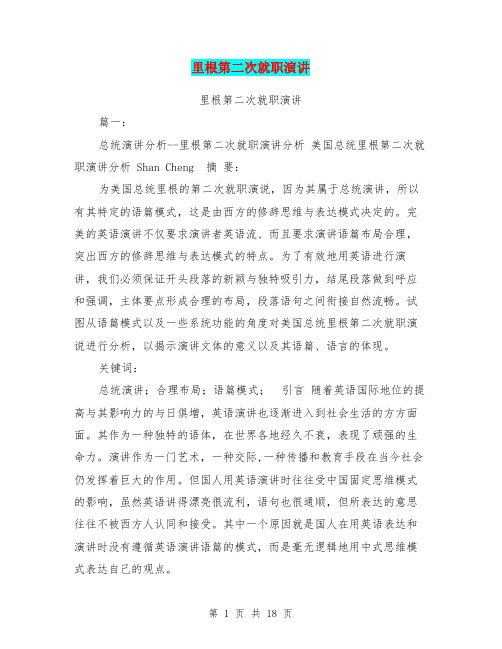
里根第二次就职演讲里根第二次就职演讲篇一:总统演讲分析--里根第二次就职演讲分析美国总统里根第二次就职演讲分析 Shan Cheng 摘要:为美国总统里根的第二次就职演说,因为其属于总统演讲,所以有其特定的语篇模式,这是由西方的修辞思维与表达模式决定的。
完美的英语演讲不仅要求演讲者英语流、而且要求演讲语篇布局合理,突出西方的修辞思维与表达模式的特点。
为了有效地用英语进行演讲,我们必须保证开头段落的新颖与独特吸引力,结尾段落做到呼应和强调,主体要点形成合理的布局,段落语句之间衔接自然流畅。
试图从语篇模式以及一些系统功能的角度对美国总统里根第二次就职演说进行分析,以揭示演讲文体的意义以及其语篇、语言的体现。
关键词:总统演讲;合理布局;语篇模式;引言随着英语国际地位的提高与其影响力的与日俱增,英语演讲也逐渐进入到社会生活的方方面面。
其作为一种独特的语体,在世界各地经久不衰,表现了顽强的生命力。
演讲作为一门艺术,一种交际,一种传播和教育手段在当今社会仍发挥着巨大的作用。
但国人用英语演讲时往往受中国固定思维模式的影响,虽然英语讲得漂亮很流利,语句也很通顺,但所表达的意思往往不被西方人认同和接受。
其中一个原因就是国人在用英语表达和演讲时没有遵循英语演讲语篇的模式,而是毫无逻辑地用中式思维模式表达自己的观点。
一、英语演讲语篇的基本模式及其概念英语演讲的语篇构成有三大部分:Introdution,Bod,Conlusion。
Introdution 的功能为吸引听众、引起关注、建立演讲者的信誉、简述演讲主体中的要点。
Bod,即演讲的主体部分。
演讲者可以根据演讲的主题按不同的模式组织布局。
如可以根据时间、空间顺序可以遵循因果顺序、问题和方式顺序;亦可以将演讲主题细分为几个分点进行阐述。
演讲的主体部分将在第二部分详述。
同时,演讲的结尾部分也应当是演讲的高潮部分,演讲者需要总结演讲的主旨和意图,并以一种使听众产生共鸣的方式来升华主题,并与 introdution相呼应,给听众一种心理上的统一感。
罗纳德-里根
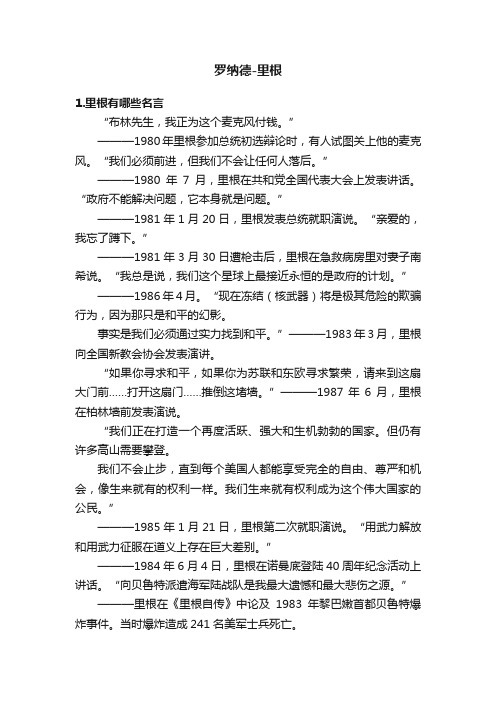
罗纳德-里根1.里根有哪些名言“布林先生,我正为这个麦克风付钱。
”———1980年里根参加总统初选辩论时,有人试图关上他的麦克风。
“我们必须前进,但我们不会让任何人落后。
”———1980年7月,里根在共和党全国代表大会上发表讲话。
“政府不能解决问题,它本身就是问题。
”———1981年1月20日,里根发表总统就职演说。
“亲爱的,我忘了蹲下。
”———1981年3月30日遭枪击后,里根在急救病房里对妻子南希说。
“我总是说,我们这个星球上最接近永恒的是政府的计划。
”———1986年4月。
“现在冻结(核武器)将是极其危险的欺骗行为,因为那只是和平的幻影。
事实是我们必须通过实力找到和平。
”———1983年3月,里根向全国新教会协会发表演讲。
“如果你寻求和平,如果你为苏联和东欧寻求繁荣,请来到这扇大门前……打开这扇门……推倒这堵墙。
”———1987年6月,里根在柏林墙前发表演说。
“我们正在打造一个再度活跃、强大和生机勃勃的国家。
但仍有许多高山需要攀登。
我们不会止步,直到每个美国人都能享受完全的自由、尊严和机会,像生来就有的权利一样。
我们生来就有权利成为这个伟大国家的公民。
”———1985年1月21日,里根第二次就职演说。
“用武力解放和用武力征服在道义上存在巨大差别。
”———1984年6月4日,里根在诺曼底登陆40周年纪念活动上讲话。
“向贝鲁特派遣海军陆战队是我最大遗憾和最大悲伤之源。
”———里根在《里根自传》中论及1983年黎巴嫩首都贝鲁特爆炸事件。
当时爆炸造成241名美军士兵死亡。
“几个月前,我告诉美国人,我没有用武器换人质。
我的心和美好意愿仍告诉我,这是真的。
但事实和证据告诉我这不是真的。
”“当你到了我这个年纪,如果你一直好好活着,就一定犯下许多错误。
所以你学习,从长远考虑。
你集中所有精力。
你出现变化,你向前进。
我的美国同胞们,我要在未来两年内同你们、为你们完成一个大交易。
主啊,那就是我想做的。
”———1987年3月4日,里根承认以武器换取被伊朗扣留的美国人质。
美国历届总统就职演讲稿

美国历届总统就职演讲稿美国历届总统就职演讲稿美国是世界上最强大的国家之一,每当一个新总统上任时,他都需要在国会大厦的就职典礼上发表演讲,宣誓就职并介绍他的政治愿景。
这些就职演讲稿是美国历史上一些最重要的政治讲话之一,它们描绘了该国的未来方向,同时向全世界展示该国的价值和道德标准。
现在,让我们回顾一下一些重要而难忘的美国历届总统就职演讲稿。
华盛顿的就职演讲(1789)乔治·华盛顿成为美国第一任总统时,他在1789年4月30日在联邦大厦前宣誓就职。
在他的演讲中,华盛顿强调了联邦政府的重要性,并试图消除各个州之间的分歧,奠定了美国政府的基础。
林肯第二次就职演讲(1865)林肯第二次就职演讲是美国历史上最有名的就职演讲之一。
在恢复国家的艰难时期,林肯在典礼上提出了“和平、团结、正义”的口号,他的讲话也被认为是对奴隶制度废除的胜利在道义上的肯定。
罗斯福第一次就职演讲(1933)富兰克林·罗斯福在他的第一次就职演讲中,承诺通过“新政”政策扭转大萧条的局面。
他提出了“唯有恐惧本身才是我们所应害怕的”这一名言,鼓舞了美国人的信心,促进了国家的复苏。
肯尼迪就职演讲(1961)约翰·肯尼迪的就职演讲被誉为美国历史上最具启发性和激情澎湃的演讲之一。
他在演讲中提出了“不要问国家为你们能做些什么,而要问你们可以为国家做些什么”的名言,这真正地激励了所有的美国人为自己的国家做出贡献。
尼克松第一次就职演讲(1969)理查德·尼克松在他的第一次就职演讲中,承诺结束越南战争,并带领美国人民消除一切分裂。
他表示,他的首要任务是在极其分裂的美国社会中建立和谐。
这一演讲推动了美国的社会改革,缩小了美国社会的分裂。
奥巴马第一次就职演讲(2009)巴拉克·奥巴马成为第一个非白人美国总统,并在他的第一次就职典礼典礼上表达了自己对2008年大选的胜利兴奋以及对美国人民的期望。
他的演讲中,奥巴马渲染了美国困境,特别是经济上的困境,并谈到了一个更加团结的美国。
里根在复旦的演讲稿-英汉对照版-全
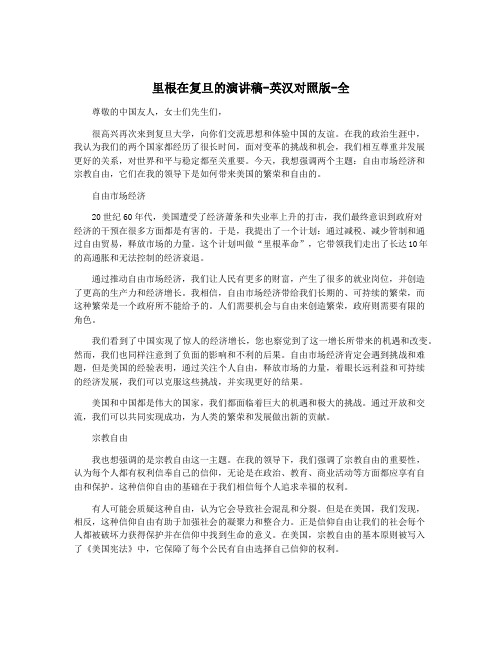
里根在复旦的演讲稿-英汉对照版-全尊敬的中国友人,女士们先生们,很高兴再次来到复旦大学,向你们交流思想和体验中国的友谊。
在我的政治生涯中,我认为我们的两个国家都经历了很长时间,面对变革的挑战和机会,我们相互尊重并发展更好的关系,对世界和平与稳定都至关重要。
今天,我想强调两个主题:自由市场经济和宗教自由,它们在我的领导下是如何带来美国的繁荣和自由的。
自由市场经济20世纪60年代,美国遭受了经济萧条和失业率上升的打击,我们最终意识到政府对经济的干预在很多方面都是有害的。
于是,我提出了一个计划:通过减税、减少管制和通过自由贸易,释放市场的力量。
这个计划叫做“里根革命”,它带领我们走出了长达10年的高通胀和无法控制的经济衰退。
通过推动自由市场经济,我们让人民有更多的财富,产生了很多的就业岗位,并创造了更高的生产力和经济增长。
我相信,自由市场经济带给我们长期的、可持续的繁荣,而这种繁荣是一个政府所不能给予的。
人们需要机会与自由来创造繁荣,政府则需要有限的角色。
我们看到了中国实现了惊人的经济增长,您也察觉到了这一增长所带来的机遇和改变。
然而,我们也同样注意到了负面的影响和不利的后果。
自由市场经济肯定会遇到挑战和难题,但是美国的经验表明,通过关注个人自由,释放市场的力量,着眼长远利益和可持续的经济发展,我们可以克服这些挑战,并实现更好的结果。
美国和中国都是伟大的国家,我们都面临着巨大的机遇和极大的挑战。
通过开放和交流,我们可以共同实现成功,为人类的繁荣和发展做出新的贡献。
宗教自由我也想强调的是宗教自由这一主题。
在我的领导下,我们强调了宗教自由的重要性,认为每个人都有权利信奉自己的信仰,无论是在政治、教育、商业活动等方面都应享有自由和保护。
这种信仰自由的基础在于我们相信每个人追求幸福的权利。
有人可能会质疑这种自由,认为它会导致社会混乱和分裂。
但是在美国,我们发现,相反,这种信仰自由有助于加强社会的凝聚力和整合力。
美国总统演讲稿之里根2
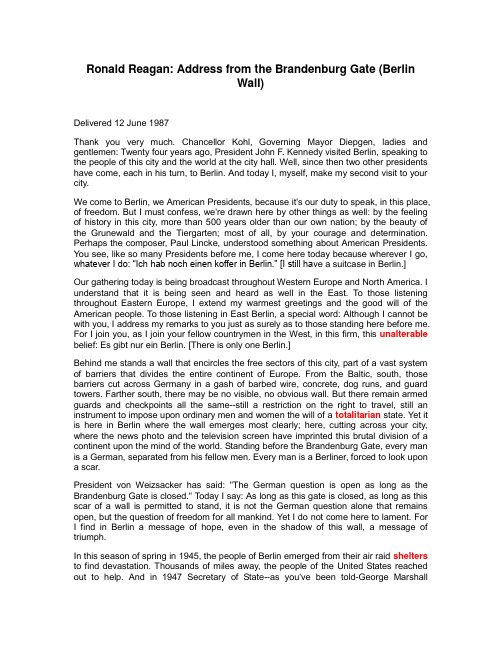
Ronald Reagan: Address from the Brandenburg Gate (BerlinWall)Delivered 12 June 1987Thank you very much. Chancellor Kohl, Governing Mayor Diepgen, ladies and gentlemen: Twenty four years ago, President John F. Kennedy visited Berlin, speaking to the people of this city and the world at the city hall. Well, since then two other presidents have come, each in his turn, to Berlin. And today I, myself, make my second visit to your city.We come to Berlin, we American Presidents, because it's our duty to speak, in this place, of freedom. But I must confess, we're drawn here by other things as well: by the feeling of history in this city, more than 500 years older than our own nation; by the beauty of the Grunewald and the Tiergarten; most of all, by your courage and determination. Perhaps the composer, Paul Lincke, understood something about American Presidents. You see, like so many Presidents before me, I come here today because wherever I go, whatever I do: “Ich hab noch einen koffer in Berlin." [I still ha ve a suitcase in Berlin.]Our gathering today is being broadcast throughout Western Europe and North America. I understand that it is being seen and heard as well in the East. To those listening throughout Eastern Europe, I extend my warmest greetings and the good will of the American people. To those listening in East Berlin, a special word: Although I cannot be with you, I address my remarks to you just as surely as to those standing here before me. For I join you, as I join your fellow countrymen in the West, in this firm, this unalterable belief: Es gibt nur ein Berlin. [There is only one Berlin.]Behind me stands a wall that encircles the free sectors of this city, part of a vast system of barriers that divides the entire continent of Europe. From the Baltic, south, those barriers cut across Germany in a gash of barbed wire, concrete, dog runs, and guard towers. Farther south, there may be no visible, no obvious wall. But there remain armed guards and checkpoints all the same--still a restriction on the right to travel, still an instrument to impose upon ordinary men and women the will of a totalitarian state. Yet it is here in Berlin where the wall emerges most clearly; here, cutting across your city, where the news photo and the television screen have imprinted this brutal division of a continent upon the mind of the world. Standing before the Brandenburg Gate, every man is a German, separated from his fellow men. Every man is a Berliner, forced to look upon a scar.President von Weizsacker has said: "The German question is open as long as the Brandenburg Gate is closed." Today I say: As long as this gate is closed, as long as this scar of a wall is permitted to stand, it is not the German question alone that remains open, but the question of freedom for all mankind. Yet I do not come here to lament. For I find in Berlin a message of hope, even in the shadow of this wall, a message of triumph.In this season of spring in 1945, the people of Berlin emerged from their air raid shelters to find devastation. Thousands of miles away, the people of the United States reached out to help. And in 1947 Secretary of State--as you've been told-George Marshallannounced the creation of what would become known as the Marshall plan. Speaking precisely 40 years ago this month, he said: "Our policy is directed not against any country or doctrine, but against hunger, poverty, desperation, and chaos."In the Reichstag a few moments ago, I saw a display commemorating this 40th anniversary of the Marshall plan. I was struck by the sign on a burnt-out, gutted structure that was being rebuilt. I understand that Berliners of my own generation can remember seeing signs like it dotted throughout the Western sectors of the city. The sign read simply: "The Marshall plan is helping here to strengthen the free world." A strong, free world in the West, that dream became real. Japan rose from ruin to become an economic giant. Italy, France, Belgium --virtually every nation in Western Europe saw political and economic rebirth; the European Community was founded.In West Germany and here in Berlin, there took place an economic miracle, the Wirtschaftswunder. Adenauer, Erhard, Reuter, and other leaders understood the practical importance of liberty--that just as truth can flourish only when the journalist is given freedom of speech, so prosperity can come about only when the farmer and businessman enjoy economic freedom. The German leaders reduced tariffs, expanded free trade, lowered taxes. From 1950 to 1960 alone, the standard of living in West Germany and Berlin doubled.Where four decades ago there was rubble, today in West Berlin there is the greatest industrial output of any city in Germany-busy office blocks, fine homes and apartments, proud avenues, and the spreading lawns of park land. Where a city's culture seemed to have been destroyed, today there are two great universities, orchestras and an opera, countless theaters, and museums. Where there was want, today there's abundance--food, clothing, automobiles-the wonderful goods of the Ku'damm. From devastation, from utter ruin, you Berliners have, in freedom, rebuilt a city that once again ranks as one of the greatest on Earth. The Soviets may have had other plans. But, my friends, there were a few things the Soviets didn't count on Berliner herz, Berliner humor, ja, und Berliner schnauze. [Berliner heart, Berliner humor, yes, and a Berliner schnauze.] [Laughter]In the 1950's, Khrushchev predicted: "We will bury you." But in the West today, we see a free world that has achieved a level of prosperity and well-being unprecedented in all human history. In the Communist world, we see failure, technological backwardness, declining standards of health, even want of the most basic kind-too little food. Even today, the Soviet Union still cannot feed itself. After these four decades, then, there stands before the entire world one great and inescapable conclusion: Freedom leads to prosperity. Freedom replaces the ancient hatreds among the nations with comity and peace. Freedom is the victor.And now the Soviets themselves may, in a limited way, be coming to understand the importance of freedom. We hear much from Moscow about a new policy of reform and openness. Some political prisoners have been released. Certain foreign news broadcasts are no longer being jammed. Some economic enterprises have been permitted to operate with greater freedom from state control. Are these the beginnings of profound changes in the Soviet state? Or are they token gestures, intended to raise false hopes in the West, or to strengthen the Soviet system without changing it? We welcome change and openness; for we believe that freedom and security go together, that the advance of human liberty can only strengthen the cause of world peace.There is one sign the Soviets can make that would be unmistakable, that would advance dramatically the cause of freedom and peace. General Secretary Gorbachev, if you seek peace, if you seek prosperity for the Soviet Union and Eastern Europe, if you seek liberalization: Come here to this gate! Mr. Gorbachev, open this gate! Mr. Gorbachev, tear down this wall!I understand the fear of war and the pain of division that afflict this continent--and I pledge to you my country's efforts to help overcome these burdens. To be sure, we in the West must resist Soviet expansion. So we must maintain defenses of unassailable strength. Yet we seek peace; so we must strive to reduce arms on both sides. Beginning 10 years ago, the Soviets challenged the Western alliance with a grave new threat, hundreds of new and more deadly SS-20 nuclear missiles, capable of-striking every capital in Europe. The Western alliance responded by committing itself to a counter deployment unless the Soviets agreed to negotiate a better solution; namely, the elimination of such weapons on both sides. For many months, the Soviets refused to bargain in earnestness. As the alliance, in turn, prepared to go forward with its counter deployment, there were difficult days--days of protests like those during my 1982 visit to this city--and the Soviets later walked away from the table.But through it all, the alliance held firm. And I invite those who protested then--I invite those who protest today--to mark this fact: Because we remained strong, the Soviets came back to the table. And because we remained strong, today we have within reach the possibility, not merely of limiting the growth of arms, but of eliminating, for the first time, an entire class of nuclear weapons from the face of the Earth. As I speak, NATO ministers are meeting in Iceland to review the progress of our proposals for eliminating these weapons. At the talks in Geneva, we have also proposed deep cuts in strategic offensive weapons. And the Western allies have likewise made far-reaching proposals to reduce the danger of conventional war and to place a total ban on chemical weapons. While we pursue these arms reductions, I pledge to you that we will maintain the capacity to deter Soviet aggression at any level at which it might occur. And in cooperation with many of our allies, the United States is pursuing the Strategic Defense Initiative-research to base deterrence not on the threat of offensive retaliation, but on defenses that truly defend; on systems, in short, that will not target populations, but shield them. By these means we seek to increase the safety of Europe and all the world. But we must remember a crucial fact: East and West do not mistrust each other because we are armed; we are armed because we mistrust each other. And our differences are not about weapons but about liberty. When President Kennedy spoke at the City Hall those 24 years ago, freedom was encircled, Berlin was under siege. And today, despite all the pressures upon this city, Berlin stands secure in its liberty. And freedom itself is transforming the globe.In the Philippines, in South and Central America, democracy has been given a rebirth. Throughout the Pacific, free markets are working miracle after miracle of economic growth. In the industrialized nations, a technological revolution is taking place--a revolution marked by rapid, dramatic advances in computers and telecommunications.In Europe, only one nation and those it controls refuse to join the community of freedom. Yet in this age of redoubled economic growth, of information and innovation, the Soviet Union faces a choice: It must make fundamental changes, or it will become obsolete. Today thus represents a moment of hope. We in the West stand ready to cooperate with the East to promote true openness, to break down barriers that separate people, tocreate a safer, freer world.And surely there is no better place than Berlin, the meeting place of East and West, to make a start. Free people of Berlin: Today, as in the past, the United States stands for the strict observance and full implementation of all parts of the Four Power Agreement of 1971. Let us use this occasion, the 750th anniversary of this city, to usher in a new era, to seek a still fuller, richer life for the Berlin of the future. Together, let us maintain and develop the ties between the Federal Republic and the Western sectors of Berlin, which is permitted by the 1971 agreement.And I invite Mr. Gorbachev: Let us work to bring the Eastern and Western parts of the city closer together, so that all the inhabitants of all Berlin can enjoy the benefits that come with life in one of the great cities of the world. To open Berlin still further to all Europe, East and West, let us expand the vital air access to this city, finding ways of making commercial air service to Berlin more convenient, more comfortable, and more economical. We look to the day when West Berlin can become one of the chief aviation hubs in all central Europe.With our French and British partners, the United States is prepared to help bring international meetings to Berlin. It would be only fitting for Berlin to serve as the site of United Nations meetings, or world conferences on human rights and arms control or other issues that call for international cooperation. There is no better way to establish hope for the future than to enlighten young minds, and we would be honored to sponsor summer youth exchanges, cultural events, and other programs for young Berliners from the East. Our French and British friends, I'm certain, will do the same. And it's my hope that an authority can be found in East Berlin to sponsor visits from young people of the Western sectors.One final proposal, one close to my heart: Sport represents a source of enjoyment and ennoblement, and you many have noted that the Republic of Korea -- South Korea -has offered to permit certain events of the 1988 Olympics to take place in the North. International sports competitions of all kinds could take place in both parts of this city. And what better way to demonstrate to the world the openness of this city than to offer in some future year to hold the Olympic Games here in Berlin, East and West?In these four decades, as I have said, you Berliners have built a great city. You've done so in spite of threats--the Soviet attempts to impose the East-mark, the blockade. Today the city thrives in spite of the challenges implicit in the very presence of this wall. What keeps you here? Certainly there's a great deal to be said for your fortitude, for your defiant courage. But I believe there's something de eper, something that involves Berlin’s whole look and feel and way of life--not mere sentiment. No one could live long in Berlin without being completely disabused of illusions. Something instead, that has seen the difficulties of life in Berlin but chose to accept them, that continues to build this good and proud city in contrast to a surrounding totalitarian presence that refuses to release human energies or aspirations. Something that speaks with a powerful voice of affirmation, that says yes to this city, yes to the future, yes to freedom. In a word, I would submit that what keeps you in Berlin is love--love both profound and abiding.Perhaps this gets to the root of the matter, to the most fundamental distinction of all between East and West. The totalitarian world produces backwardness because it does such violence to the spirit, thwarting the human impulse to create, to enjoy, to worship. The totalitarian world finds even symbols of love and of worship an affront. Years ago,before the East Germans began rebuilding their churches, they erected a secular structure: the television tower at Alexander Platz. Virtually ever since, the authorities have been working to correct what they view as the tower's one major flaw, treating the glass sphere at the top with paints and chemicals of every kind. Yet even today when the Sun strikes that sphere--that sphere that towers over all Berlin --the light makes the sign of the cross. There in Berlin, like the city itself, symbols of love, symbols of worship, cannot be suppressed.As I looked out a moment ago from the Reichstag, that embodiment of German unity, I noticed words crudely spray-painted upon the wall, perhaps by a young Berliner, "This wall will fall. Beliefs become reality." Yes, across Europe, this wall will fall. For it cannot withstand faith; it cannot withstand truth. The wall cannot withstand freedom.And I would like, before I close, to say one word. I have read, and I have been questioned since I've been here about certain demonstrations against my coming. And I would like to say just one thing, and to those who demonstrate so. I wonder if they have ever asked themselves that if they should have the kind of government they apparently seek, no one would ever be able to do what they're doing again.Thank you and God bless you all.☼注释☼:♫unalterable [✈⏹●♦☜❒☜♌●] adj. 不能变更的♫totalitarian [ ♦☜◆♦✌●♓♦☪☜❒♓☜⏹] adj. 极权主义的♫shelter [ ☞♏●♦☜] n. 掩蔽处, 身避处, 庇护所♫doctrine [ ♎♦❒♓⏹] n.教条, 学说♫orchestra [ ♓♦♦❒☜] n. 管弦乐队, 乐队演奏处♫unprecedented [✈⏹☐❒♏♦♓♎☜⏹♦♓♎] adj. 空前的♫liberalization [ ●♓♌☜❒☜●♋♓♏♓☞☜⏹] n. 自由主义化, 使宽大♫conventional [ ☜⏹♏⏹☞☜⏹●] adj. 惯例的, 常规的♫retaliation [❒✋♦✌●✋♊♏✋☞☹⏹] n. 报复, 报仇♫implementation [ ♓❍☐●♓❍♏⏹♦♏♓☞☜⏹] n. 执行♫aviation [ ♏♓♓♏♓☞☜⏹] n.飞行, 航空♫distinction [♎♓♦♦♓☠☞☜⏹] n. 区别, 差别♫embodiment [♓❍♌♎♓❍☜⏹♦] n. 体现, 具体化, 化身。
历届美国总统就职典礼

1789年美国第一任总统华盛顿宣誓就职
1841年哈里森总统就职大典
1861年林肯就职大典
1933年富兰克林罗斯福当选美国总统就职大典
1937年富兰克林·罗斯福连任就职宣誓
1941年富兰克林·罗斯福第三次连任美国总统1945年富兰克林·罗斯福第四次连任典礼1949年杜鲁门总统就职大典
1953年奥森豪威尔宣誓就职
1957奥森豪威尔连任就职大典
1961年肯尼迪就职大典
1965年约翰逊就职大典
1969年尼克松就职大典
1974年福特就任总统宣誓
1977年卡特总统就职大典
1981年里根当选总统就职演说
1985年里根连任就职大典
1989年老布什就职大典宣誓
1993年克林顿首次当选就职宣誓
1997年克林顿就职典礼演说
布什2001年首次当选就职大典
布什就职典礼上克林顿握手祝贺
布什2005年连任就职大典。
第二次就职演说
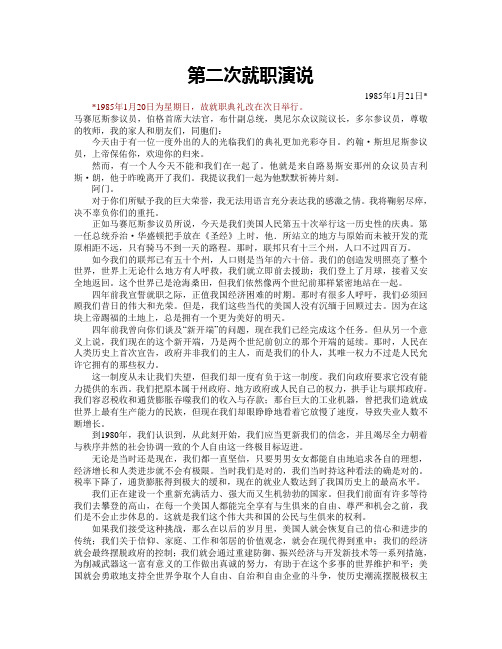
第二次就职演说1985年1月21日* *1985年1月20日为星期日,故就职典礼改在次日举行。
马赛厄斯参议员,伯格首席大法官,布什副总统,奥尼尔众议院议长,多尔参议员,尊敬的牧师,我的家人和朋友们,同胞们:今天由于有一位一度外出的人的光临我们的典礼更加光彩夺目。
约翰·斯坦尼斯参议员,上帝保佑你,欢迎你的归来。
然而,有一个人今天不能和我们在一起了。
他就是来自路易斯安那州的众议员吉利斯·朗,他于昨晚离开了我们。
我提议我们一起为他默默祈祷片刻。
阿门。
对于你们所赋予我的巨大荣誉,我无法用语言充分表达我的感激之情。
我将鞠躬尽瘁,决不辜负你们的重托。
正如马赛厄斯参议员所说,今天是我们美国人民第五十次举行这一历史性的庆典。
第一任总统乔治·华盛顿把手放在《圣经》上时,他.所站立的地方与原始而未被开发的荒原相距不远,只有骑马不到一天的路程。
那时,联邦只有十三个州,人口不过四百万。
如今我们的联邦已有五十个州,人口则是当年的六十倍。
我们的创造发明照亮了整个世界,世界上无论什么地方有人呼救,我们就立即前去援助;我们登上了月球,接着又安全地返回。
这个世界已是沧海桑田,但我们依然像两个世纪前那样紧密地站在一起。
四年前我宣誓就职之际,正值我国经济困难的时期。
那时有很多人呼吁,我们必须回顾我们昔日的伟大和光荣。
但是,我们这些当代的美国人没有沉缅于回顾过去。
因为在这块上帝踢福的土地上,总是拥有一个更为美好的明天。
四年前我曾向你们谈及“新开端”的问题,现在我们已经完成这个任务。
但从另一个意义上说,我们现在的这个新开端,乃是两个世纪前创立的那个开端的延续。
那时,人民在人类历史上首次宣告,政府并非我们的主人,而是我们的仆人,其唯一权力不过是人民允许它拥有的那些权力。
这一制度从未让我们失望,但我们却一度有负于这一制度。
我们向政府要求它没有能力提供的东西。
我们把原本属于州政府、地方政府或人民自己的权力,拱手让与联邦政府。
里根演讲稿
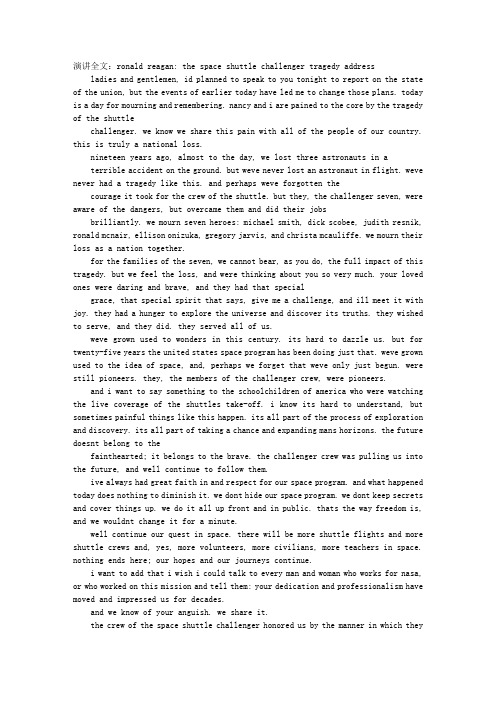
演讲全文:ronald reagan: the space shuttle challenger tragedy address ladies and gentlemen, id planned to speak to you tonight to report on the stateof the union, but the events of earlier today have led me to change those plans. todayis a day for mourning and remembering. nancy and i are pained to the core by the tragedyof the shuttlechallenger. we know we share this pain with all of the people of our country.this is truly a national loss. nineteen years ago, almost to the day, we lost three astronauts in a terrible accident on the ground. but weve never lost an astronaut in flight. wevenever had a tragedy like this. and perhaps weve forgotten the courage it took for the crew of the shuttle. but they, the challenger seven, wereaware of the dangers, but overcame them and did their jobs brilliantly. we mourn seven heroes: michael smith, dick scobee, judith resnik,ronald mcnair, ellison onizuka, gregory jarvis, and christa mcauliffe. we mourn theirloss as a nation together. for the families of the seven, we cannot bear, as you do, the full impact of thistragedy. but we feel the loss, and were thinking about you so very much. your lovedones were daring and brave, and they had that special grace, that special spirit that says, give me a challenge, and ill meet it withjoy. they had a hunger to explore the universe and discover its truths. they wishedto serve, and they did. they served all of us. weve grown used to wonders in this century. its hard to dazzle us. but fortwenty-five years the united states space program has been doing just that. weve grownused to the idea of space, and, perhaps we forget that weve only just begun. werestill pioneers. they, the members of the challenger crew, were pioneers. and i want to say something to the schoolchildren of america who were watchingthe live coverage of the shuttles take-off. i know its hard to understand, butsometimes painful things like this happen. its all part of the process of explorationand discovery. its all part of taking a chance and expanding mans horizons. the futuredoesnt belong to thefainthearted; it belongs to the brave. the challenger crew was pulling us intothe future, and well continue to follow them. ive always had great faith in and respect for our space program. and what happenedtoday does nothing to diminish it. we dont hide our space program. we dont keep secretsand cover things up. we do it all up front and in public. thats the way freedom is,and we wouldnt change it for a minute. well continue our quest in space. there will be more shuttle flights and moreshuttle crews and, yes, more volunteers, more civilians, more teachers in space.nothing ends here; our hopes and our journeys continue.i want to add that i wish i could talk to every man and woman who works for nasa,or who worked on this mission and tell them: your dedication and professionalism havemoved and impressed us for decades. and we know of your anguish. we share it. the crew of the space shuttle challenger honored us by the manner in which theylived their lives. we will never forget them, nor the last time we saw them, thismorning, as they prepared for their journey and waved goodbye and slipped the surlybonds of earth to touch the face of god. thank you.篇二:1981年里根就职演讲稿-中英文对照first inaugural address of ronald reagan里根第一任总统就职演说tuesday, january 20, 1981 第40任总统(1981年-1989年) (一)senator hatfield, mr. chief justice, mr. president, vice president bush,vicepresident mondale, senator baker, speaker oneill, reverend moomaw, and my fellow citizens: to a few of us here today, this is a solemn and most momentous occasion;and yet,authority as called for in the constitution routinely takes place as it has foralmost twocenturies and few of us stop to think how unique we really are. in the eyes ofmany in theworld, this every-4-year ceremony we accept as normal is nothing less than amiracle.议员海特菲尔德先生、法官先生、总统先生、副总统布什、蒙代尔先生、议员贝克先生、发言人奥尼尔先生、尊敬的摩麦先生,以及广大支持我的美国同胞们:今天对于我们中间的一些人来说,是一个非常庄严隆重的时刻。
历届美国总统就职演讲大全

美国历届总统就职演讲(大全)内容简介美国总统的就职演讲是美国政治的一种形式,但它已经成为了美国的一种文化,美国总统的演讲辞更成为美国、乃至世界的文化遗产。
美国是实行总统制的典型国家。
美国总统身兼国家元首和行政首脑,在三权分立的政治结构中居重要地位。
美国实行总统内阁制,每四年选举一次总统,可连选连任一次。
每当新总统当选后,便要举行庄严而隆重的就职典礼。
这是美国政治生活中的一项重大的庆典。
总统就职典礼一般有4个程序:首先是就职宣誓;宣誓之后,总统发表就职演说;演说完毕,便开始盛大的庆祝游行;最后举行舞会。
美国总统借就职演说,表明自己政见和立场,起着鼓舞人民、教育人民的作用。
为了给人民留下良好的印象,总统对演说词斟酌推敲,以求打动人心。
好的演说词常常诞生在重大历史时刻,时势造英雄,这演说词也造就了传诵千古的名篇。
这里收集的《美国历届总统就职演讲(大全)》主要参考了李其荣《美国历届总统就职演讲辞》,另有一部分是从网络媒体下载的,并增加了最新的2013年奥巴马第二次就职演讲内容。
但第二十四届第二十一任切斯特·艾伦·阿瑟、第二十九届第二十六任西奥多•罗斯福、第三十四届第三十任卡尔文-柯立芝、第四十届第三十三任哈里·杜鲁门和第四十四届第三十六任林顿·约翰逊的就职演讲译文未找到。
截至目前,这个版本应该是收集的美国总统就职演讲大全了。
另附李其荣《美国历届总统就职演讲辞》“前言”。
目录第一届第一任乔治·华盛顿(1789~1793)首次就职演讲第二届第一任乔治·华盛顿(1793~1797)第二次就职演讲第三届第二任约翰·亚当斯(1797~1801)就职演讲第四届第三任托马斯·杰斐逊(1801~1805)首次就职演讲第五届第三任托马斯·杰斐逊(1805~1809)第二次就职演讲第六届第四任詹姆斯·麦迪逊(1809~1813)首次就职演讲第七届第四任詹姆斯·麦迪逊(1813-1817)第二次就职演讲第八届第五任詹姆斯·门罗(1817-1821)首次就职演讲第九届第五任詹姆斯·门罗(1821~1825)第二次就职演讲第十届第六任约翰·昆西·亚当斯(1825~1829)就职演讲第十一届第七任安德鲁·杰克逊(1829-1833)首次就职演讲第十二届第七任安德鲁·杰克逊(1833~1837)第二次就职演讲第十三届第八任马丁·范·布伦(1837~1841)就职演讲第十四届第九任威廉·亨利·哈里森(1841)就职演讲第十四届第十任约翰·泰勒(1841~1845)就职演讲第十五届第十一任詹姆斯·波尔克(1845~1849)就职演讲第十六届第十二任扎卡里·泰勒(1849~1850)就职演讲第十六届第十三任米勒德·菲尔莫尔(1850~1853)就职演讲第十七届第十四任富兰克林·皮尔斯(1853~1857)就职演讲第十八届第十五任詹姆斯·布坎南(1857~1861)就职演讲第十九届第十六任亚伯拉罕·林肯(1861~1865)首次就职演讲第二十届第十六任亚伯拉罕·林肯(1865)第二次就职演讲第二十届第十七任安德鲁·约翰逊(1865~1869)就职演讲第二十一届第十八任尤利西斯·格兰特(1869-1873)首次就职演讲第二十二届第十八任尤利西斯·格兰特(1873~1877)第二次就职演讲第二十三届第十九任拉瑟福德·海斯(1877~1881)就职演讲第二十四届第二十任詹姆斯·加菲尔德(1881)就职演讲第二十四届第二十一任切斯特·艾伦·阿瑟(1881~1885)就职演讲(暂无演讲词)第二十五届第二十二任格罗弗·克利夫兰(1885~1889)就职演讲第二十六届第二十三任本杰明·哈里森(1889-1893)就职演讲第二十七届第二十四任格罗弗·克利夫兰(1893~1897)就职演讲第二十八届第二十五任威廉·麦金莱(1897~1901)首次就职演讲第二十九届第二十五任威廉·麦金莱(1901)第二次就职演讲第二十九届第二十六任西奥多·罗斯福(1901~1905)首次就职演讲第三十届第二十六任西奥多·罗斯福(1905~1909)第二次就职演讲第三十一届第二十七任威廉·塔夫特(1909~1913)就职演讲第三十二届第二十八任伍德罗·威尔逊(1913-1917)首次就职演讲第三十三届第二十八任伍德罗·威尔逊(1917~1921)第二次就职演讲第三十四届第二十九任华伦·哈丁(1921~1923)就职演讲第三十四届第三十任卡尔文-柯立芝(1923~1925)就职演讲第三十五届第三十任卡尔文-柯立芝(1925-1929)就职演讲第三十六届第三十一任赫伯特·胡佛(1929~1933)就职演讲第三十七届第三十二任富兰克林·罗斯福(1933~1937)首次就职演讲第三十八届第三十二任富兰克林·罗斯福(1937~1941)第二次就职演讲第三十九届第三十二任富兰克林·罗斯福(1941~1945)第三次就职演讲第四十届第三十二任富兰克林·罗斯福(1945)第四次就职演讲第四十届第三十三任哈里·杜鲁门(1945~1949)首次就职演讲(暂无演讲词)第四十一届第三十三任哈里·杜鲁门(1949~1953)第二次就职演讲第四十二届第三十四任德怀特·艾森豪威尔威尔(1953-1957)首次就职演讲第四十三届第三十四任德怀特·艾森豪威尔威尔(1957~1961)第二次就职演讲第四十四届第三十五任约翰·肯尼迪(1961~1963)就职演讲第四十四届第三十六任林顿·约翰逊(1963~1965)首次就职演讲(无演讲词)第四十五届第三十六任林顿·约翰逊(1965~1969)第二次就职演讲第四十六届第三十七任理查德德·尼克松(1969~1973)首次就职演讲第四十七届第三十七任理查德德·尼克松(1973~1974)第二次就职演讲第四十七届第三十八任杰拉德·鲁道夫·福特(1974~1977)就职演讲第四十八届第三十九任杰米·卡特(1977~1981)就职演讲第四十九届第四十任罗纳德·里根(1981-1985)首次就职演讲第五十届第四十任罗纳德·里根(1985-1989)第二次就职演讲第五十一届第四十一任乔治·布什(1989~1993)就职演讲第五十二届第四十二任比尔·克林顿(1993~1997)首次就职演讲第五十三届第四十二任比尔·克林顿(1997-2001)第二次就职演讲第五十四届第四十三任乔治·沃克·布什(2001~2005)首次就职演讲第五十五届第四十三任乔治·沃克·布什(2005~2009)第二次就职演讲第五十六届第四十四任巴拉克·奥巴马(2008~2013)首次就职演讲第五十七届第四十四任巴拉克·奥巴马(2013~2017)第二次就职演讲(注:以下所谓届、任——届:根据美国宪法,总统选举每四年举行一次,总统任期四年,任满四年为一届。
里根发言稿

里根发言稿尊敬的各位嘉宾、朋友们:大家好!非常荣幸能够在这里与诸位共同出席今天的活动。
我是美国第40任总统罗纳德·威尔逊·里根,今天,我想与大家分享一些我作为总统时的发言稿。
四十年前的今天,我站在总统职位上,承诺要为美国人民带来一片更加繁荣、自由和安宁的未来。
作为一个国家的领导者,我意识到一切优秀的事物都需要一个坚实的基础。
对于美国来说,这个基础就是我们坚守的价值观和信念,以及我们对自由和正义的承诺。
在二战后的许多年里,美国人民付出了巨大的努力,使我们的国家变得更加强大和繁荣。
然而,我们也面临着许多挑战。
经济的衰退、政府的庞大和失控、还有社会上的分歧和紧张都是我们面临的问题。
作为总统,我认为我的首要任务是恢复美国人民的信心和自信。
我相信,只有通过引导人民回归价值观和信念,帮助他们重新找到自己的目标和目标,我们才能实现国家的繁荣和幸福。
我们的核心信念之一,就是相信个人的能力和创造力。
在美国,个人努力和奋斗的精神是得到高度尊重和赞扬的。
我们相信,只要每个人都能拥有平等的机会,就能够施展自己的才能,实现自己的梦想。
为了实现这一目标,我提出了一系列的政策和改革,以促进经济增长和创造就业机会。
我们大幅度削减了税收和精简了政府机构,以降低企业和个人的负担,并激发创新和创造力。
我们也提出了一系列的教育改革方案,旨在提高公众教育水平,以使每个人都有机会接受高质量的教育。
在国际事务上,美国始终秉持着自由和正义的信念,致力于维护全球和平与稳定。
当时,世界正陷入冷战的漩涡,国际关系紧张不安。
作为美国总统,我坚信我们应该坚定地对抗那些试图侵犯我们价值观和自由的力量。
在我执政期间,美国采取了各种措施来保护我们国家的安全。
我们加强了军事实力和战略防御能力,加强了我们与盟国的合作,共同抵抗那些试图破坏国际秩序的势力。
然而,面对这些挑战和改革,我们也遇到了许多困难和阻力。
有些人认为我们的改革措施过于激进,有些人则担心我们的国家价值观和信念正在受到侵蚀。
里根总统的离职演说

里根总统的离职演说第一篇:里根总统的离职演说Ronald Reagan: Farewell Address to the Nation My fellow Americans:This is the 34th time I'll speak to you from the Oval Office and the last.We've been together 8 years now,and soon it'll be time for me to go.But before I do,I wanted to share some thoughts,some of which I've been saving for a long time.It's been the honor of my life to be your President.So many of you have written the past few weeks to say thanks,but I could say as much to you.Nancy and I are grateful for the opportunity you gave us to serve.One of the things about the Presidency is that you're always somewhat apart.You spent a lot of time going by too fast in a car someone else is driving,and seeing the people through tinted glass ——the parents holding up a child,and the wave you saw too late and couldn't return.And so many times I wanted to stop and reach out from behind the glass,and connect.Well,maybe I can do a little of that tonight.People ask how I feel about leaving.And the fact is,“parting is such sweet sorrow.” The sweet part is California and the ranch and freedom.The sorrow —— the goodbyes,of course,and leaving this beautiful place.You know,down the hall and up the stairs from this office is the part of the White House where the President and his family live.There are a few favorite windows I have up there that I like to stand and look out of early in the morning.The view is over the grounds here to the Washington Monument,and then the Mall and the Jefferson Memorial.But on mornings when the humidity is low,you can see past the Jefferson to the river,the Potomac,and the Virginiashore.Someone said that's the view Lincoln had when he saw the smoke rising from the Battle of Bull Run.Well I see more prosaic things: the grass on the banks,the morning traffic as people make their way to work,now and then a sailboat on the river.I've been thinking a bit at that window.I've been reflecting on what the past ,then the Mall and the Jefferson Memorial.But on mornings when the humidity is low,you can see past the Jefferson to the river,the Potomac,and the Virginia shore.Someone said that's the view Lincoln had when he saw the smoke rising from the Battle of Bull Run.Well I see more prosaic things: the grass on the banks,the morning traffic as people make their way to work,now and then a sailboat on the river.I've been thinking a bit at that window.I've been reflecting on what the past 8 years have meant and mean.And the image that comes to mind like a refrain is a nautical one —— a small story about a big ship,and a refugee,and a sailor.It was back in the early eighties,at the height of the boat people.And the sailor was hard at work on the carrier Midway,which was patrolling the South China Sea.The sailor,like most American servicemen,was young,smart,and fiercely observant.The crew spied on the horizon a leaky little boat.And crammed inside were refugees from Indochina hoping to get to America.The Midway sent a small launch to bring them to the ship and safety.As the refugees made their way through the choppy seas,one spied the sailor on deck,and stood up,and called out to him.He yelled,“Hello,American sailor.Hello,freedom man.”A small moment with a big meaning,a moment the sailor,who wrote it in a letter,couldn't get out of his mind.And,when I saw it,neither could I.Because that's what it has to —— it was to be an American in the 1980's.We stood,again,for freedom.Iknow we always have,but in the past few years the world again —— and in a way,we ourselves —— rediscovered it.It's been quite a journey this decade,and we held together through some stormy seas.And at the end,together,we're reaching our destination.The fact is,from Grenada to the Washington and Moscow summits,from the recession of '81 to '82,to the expansion that began in late '82 and continues to this day,we've made a difference.The way I see it,there were two great triumphs,two things that I'm proudest of.One is the economic recovery,in which the people of America created —— and filled —— 19million new jobs.The other is the recovery of our morale.America is respected again in the world and looked to for leadership.Something that happened to me a few years ago reflects some of this.It was back in 1981,and I was attending my first big economic summit,which was held that year in Canada.The meeting place rotates among the member countries.The opening meeting was a formal dinner for the heads of government of the seven industrialized nations.Well I sat there like the new kid in school and listened,and it was all Francois this and Helmut that.They dropped titles and spoke to one another on a first-name basis.Well,at one point I sort of leaned in and said,“My name's Ron.” Well,in that same year,we began the actions we felt would ignite an economic comeback —— cut taxes and regulation,started to cut spending.And soon the recovery began..Two years later,another economic summit with pretty much the same cast.At the big opening meeting we all got together,and all of a sudden,just for a moment,I saw that everyone was just sitting there looking at me.And then one of them broke the silence.“T ell us about the American miracle,”he said.Well,back in 1980,when I was running for President,it was all so different.Some pundits said our programs would result in catastrophe.Our views on foreign affairs would cause war.Our plans for the economy would cause inflation to soar and bring about economic collapse.I even remember one highly respected economist saying,back in 1982,that “The engines of economic growth have shut down here,and they're likely to stay that way for years to come.” Well,he and the other opinion leaders were wrong.The fact is what they call “radical” was really “right.” What they called “dangerous” was just “desperately needed.”And in all of that time I won a nickname,“The Great Communicator.” But I never thought it was my style or the words I used that made a difference: it was the content.I wasn't a great communicator,but I communicated great things,and they didn't spring full bloom from mybrow,they came from the heart of a great nation —— from our experience,our wisdom,and our belief in the principles that have guided us for two centuries.They called it the “Reagan Revolution.” Well,I'll accept that,but for me it always seemed more like the great rediscovery,a rediscovery of our values and our common mon sense told us that when you put a big tax on something,the people will produce less of it.So,we cut the people's tax rates,and the people produced more than ever before.The economy bloomed like a plant that had been cut back and could now grow quicker and stronger.Our economic program brought about the longest peacetime expansion in our history:real family income up,the poverty rate down,entrepreneurship booming,and an explosion in research and new technology.We're exporting more than ever becauseAmerican industry became more competitive.And at the same time,we summoned the national will to knock down protectionist walls abroad instead of erecting them at mon sense also told us that to preserve the peace,we'd have to become strong again after years of weakness and confusion.So,we rebuilt our defenses,and this New Year we toasted the new peacefulness around the globe.Not only have the superpowers actually begun to reduce their stockpiles of nuclear weapons —— and hope for even more progress is bright ——but the regional conflicts that rack the globe are also beginning to cease.The Persian Gulf is no longer a war zone.The Soviets are leaving Afghanistan.The Vietnamese are preparing to pull out of Cambodia,and an American-mediated accord will soon send 50,000 Cuban troops home from Angola.The lesson of all this was,of course,that because we're a great nation,our challenges seem complex.It will always be this way.But as long as we remember our first principles and believe in ourselves,the future will always be ours.And something else we learned:Once you begin a great movement,there's no telling where it'll end.We meant to change a nation,and instead,we changed a world.Countries across the globe are turning to free markets and free speech and turning away fromthe ideologies of the past.For them,the great rediscovery of the 1980's has been that,lo and behold,the moral way of government is the practical way of government: Democracy,the profoundly good,is also the profoundly productive.When you've got to the point when you can celebrate the anniversaries of your 39th birthday,you can sit back sometimes,review your life,and see it flowing before you.For me there was a fork in the river,and it was right in the middle of my life.I never meant togo into politics.It wasn't my intention when I was young.But I was raised to believe you had to pay your way for the blessings bestowed on you.I was happy with my career in the entertainment world,but I ultimately went into politics because I wanted to protect something precious.Ours was the first revolution in the history of mankind that truly reversed the course of government,and with three little words:“We the People.” “We the People” tell the government wha t to do; it doesn't tell us.“We the People” are the driver; the government is the car,and we decide where it should go,and by what route,and how fast.Almost all the world's constitutions are documents in which governments tell the people what their privileges are.Our Constitution is a document in which “We the People” tell the government what it is allowed to do.“We the People” are free.This belief has been the underlying basis for everything I've tried to do these past 8 years.But back in the 1960's,when I began,it seemed to me that we'd begun reversing the order of things —— that through more and more rules and regulations and confiscatory taxes,the government was taking more of our money,more of our options,and more of our freedom.I went into politics in part to put up my hand and say,“Stop.” I was a citizen politician,and it seemed the right thing for a citizen to do.I think we have stopped a lot of what needed stopping.And I hope we have once again reminded people that man is not free unless government is limited.There's a clear cause and effect here that is as neat and predictable as a law of physics:“As government expands,liberty contracts.”Nothing is less free than pure communism —— and yet we have,the past few years,forged a satisfying new closeness with the Soviet Union.I've been asked if this isn't a gamble,and myanswer is no because we're basing our actions not on words but deeds.The detente of this 1970's was based not on actions but promises.They'd promise to treat their own people and the people of the world better.But the gulag was still the gulag,and the state was still expansionist,and they still waged proxy wars in Africa,Asia,and Latin America.Well,this time,so far,it's different.President Gorbachev has brought about some internal democratic reforms and begun the withdrawal from Afghanistan.He has also freed prisoners whose names I've given him every time we've met.But life has a way of reminding you of big things through small incidents.Once,during the heady days of the Moscow summit,Nancy and I decided to break off from the entourage one afternoon to visit the shops on Arbat Street ——that's a little street just off Moscow's main shopping area.Even though our visit was a surprise,every Russian there immediately recognized us and called out our names and reached for our hands.We were just about swept away by the warmth.You could almost feel the possibilities in all that joy.But within seconds,a KGB detail pushed their way toward us and began pushing and shoving the people in the crowd.It was an interesting moment.It reminded me that while the man on the street in the Soviet Union yearns for peace,the government is Communist.And those who run it are Communists,and that means we and they view such issues as freedom and human rights very differently.We must keep up our guard,but we must also continue to work together to lessen and eliminate tension and mistrust.My view is that President Gorbachev is different from previous Soviet leaders.I think he knows some of the things wrong with his society and is trying to fix them.We wish him well.And we'll continue to work to make sure that the SovietUnion that eventually emerges from this process is a less threatening one.What it all boils down to is this: I want the new closeness to continue.And it will,as long as we make it clear that we will continue to act in a certain way as long as they continue to act in a helpful manner.If and when they don't,at first pull your punches.If they persist,pull the plug.It's still trust but verify.It'sstill play,but cut the cards.It's still watch closely.And don't be afraid to see what you see.I've been asked if I have any regrets.Well,I do.The deficit is one.I've been talking a great deal about that lately,but tonight isn't for arguments,and I'm going to hold my tongue.But an observation:I've had my share of victories in the Congress,but what few people noticed is that I never won anything you didn't win for me.They never saw my troops;they never saw Reagan's regiments,the American people.You won every battle with every call you made and letter you wrote demanding action.Well,action is still needed.If we're to finish the job,Reagan's regiments will have to become the Bush brigades.Soon he'll be the Chief,and he'll need you every bit as much as I did.Finally,there is a great tradition of warnings in Presidential farewells,and I've got one that's been on my mind for some time.But oddly enough it starts with one of the things I'm proudest of in the past 8 years:the resurgence of national pride that I called,“The New Patriotism.” This national feeling is good,but it won't count for much,and it won't last unless it's grounded in thoughtfulness and knowledge.An informed patriotism is what we want.And are we doing a good enough job teaching our children what America is and what she represents in the long history of the world? Those of us who are over 35 or so years of age grew up in a differentAmerica.We were taught,very directly,what it means to be an American.And we absorbed,almost in the air,a love of country and an appreciation of its institutions.If you didn't get these things from your family you got them from the neighborhood,from the father down the street who fought in Korea or the family who lost someone at Anzio.Or you could get a sense of patriotism from school.And if all else failed you could get a sense of patriotism from the popular culture.The movies celebrated democratic values and implicitly reinforced the idea that America was was like that,too,through the mid-sixties.But now,we're about to enter the nineties,and some things have changed.Younger parents aren't sure that an unambivalent appreciation of America is the right thing to teach modern children.And as for those who create the popular culture,well-grounded patriotism is no longer the style.Our spirit is back,but we haven't reinstitutionalized it.We've got to do a better job of getting across that America is freedom —— freedom of speech,freedom of religion,freedom of enterprise.And freedom is special and rare.It's fragile; it needs production [protection].So,we've got to teach history based not on what's in fashion but what's important —— why the Pilgrims came here,who Jimmy Doolittle was,and what those 30 seconds over Tokyo meant.You know,4 years ago on the 40th anniversary of D-day,I read a letter from a young woman writing to her late father,who had fought on Omaha Beach.Her name was Lisa Zanatta Henn,and she said,“we will always remember,we will never forget what the boys of Normandy did.” Well,let's help her keep her word.If we forget what we did,we won't know who we are.I'm warning of an eradication of that —— of the American memory that could result,ultimately,in an erosion of the American spirit.Let's startwith some basics:more attention to American history and a greater emphasis on civic ritual.And let me offer lesson number one about America: All great change in America begins at the dinner table.So,tomorrow night in the kitchen I hope the talking begins.And children,if your parents haven't been teaching you what it means to be an American,let 'em know and nail 'em on it.That would be a very American thing to do.And that's about all I have to say tonight,except for one thing.The past few days when I've been at that window upstairs,I've thought a bit of the 'shining city upon a hill.' The phrase comes from John Winthrop,who wrote it to describe the America he imagined.What he imagined was important because he was an early Pilgrim,an early freedom man.He journeyed here on what today we'd call a little wooden boat;and like the other Pilgrims,he was looking for a home that would be free.I've spoken of the shining city all my political life,but I don't know if I ever quite communicated what I saw when I said it.But in my mind it was a tall,proud city built on rocks stronger than oceans,windswept,God-blessed,and teeming with people of all kinds living in harmony and peace; a city with free ports that hummed with commerce and creativity.And if there had to be city walls,the walls had doors and the doors were open to anyone with the will and the heart to get here.That's how I saw it,and see it still.And how stands the city on this winter night?More prosperous,more secure,and happier than it was 8 years ago.But more than that:After 200 years,two centuries,she still stands strong and true on the granite ridge,and her glow has held steady no matter what storm.And she's still a beacon,still a magnet for all who must have freedom,for all the pilgrims from all the lost places who are hurtling through the darkness,towardhome.We've done our part.And as I walk off into the city streets,a final word to the men and women of the Reagan Revolution,the men and women across America who for 8 years did the work that brought America back.My friends: We did it.We weren't just marking time.We made a difference.We made the city stronger;we made the city freer; and we left her in good hands.All in all,not bad —— not bad at all.And so,goodbye,God bless you,and God bless the United States of America.第二篇:美国第40任总统里根告别演说美国第40任总统里根告别演说(全文)时间:1989年1月11日地点:白宫我来说两句同胞们,这是我第34次,也是最后一次在椭圆形办公室向你们讲话。
里根就任发言稿

里根就任发言稿尊敬的美国国民:感谢大家对我的支持和信任,今天我站在这里庄重宣誓就任美利坚合众国第40届总统。
我知道,在这个伟大的国家的历史上,我将承担重任。
作为总统,我将尽我所能,为美国和美国人民的利益而奋斗。
我还清晰地记得我第一次踏足白宫的那一刻,那是一种令人激动的时刻。
那时我向往的并不是权力和荣耀,而是为这个国家做出一些改变,为人民谋福祉。
在我就任总统之际,我深感美国正面临着一系列重大挑战。
经济的不稳定、失业率的上升、贫困问题的日益突出,这些都是我们所面临的紧迫问题。
我们不能坐以待毙,我们必须争分夺秒,采取有力的措施,为美国的经济恢复和人民的福祉做出努力。
首先,我将致力于促进经济增长和创造就业机会。
我们需要采取更加积极的政策,鼓励企业投资和扩张,为创业者提供更多的支持。
我们还要加大对教育的投资,提高人民的素质和技能水平,为他们创造更多的就业机会。
其次,我将努力解决贫困问题。
贫困是我们这个国家最大的耻辱之一,我们不能置之不理。
我将提出一系列减贫计划,包括增加政府对贫困人群的直接援助和提供更多的就业机会。
我还将推动改革社会保障体系,确保每个人都能获得基本的福利和保障。
此外,我将致力于改善医疗系统和提高医疗保健服务的质量。
我们的医疗系统存在着许多问题,比如高昂的医疗费用和不公平的医疗资源分配。
我将推动医疗改革,保障每个人都能获得高质量的医疗保健。
同样重要的是,我将加强国家安全的力度,确保美国的安全和利益不受威胁。
我将加大对恐怖主义的打击力度,联合其他国家加强国际合作,构建一个更加和平与安全的世界。
作为总统,我将尊重和坚守美国的核心价值观。
我将致力于维护宪法的权威,保护每个人的基本权利和自由。
我将尊重国会和司法部门的独立性,确保我们的国家保持着均衡和稳定。
最后,我希望借此机会向所有的美国人民发出一个呼吁。
让我们团结起来,共同努力,为我们的国家和人民谋福祉。
让我们抛弃分裂和仇恨,追求团结和进步。
让我们展示出一个团结、强大和充满机遇的美国。
盘点美历任总统第二次就职礼
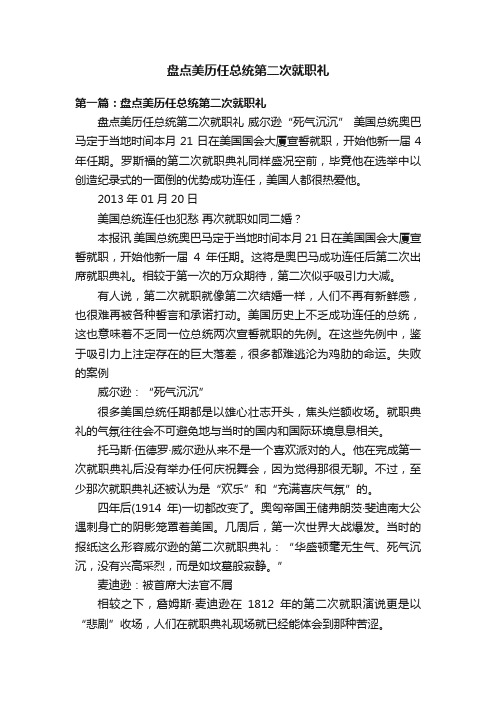
盘点美历任总统第二次就职礼第一篇:盘点美历任总统第二次就职礼盘点美历任总统第二次就职礼威尔逊“死气沉沉” 美国总统奥巴马定于当地时间本月21日在美国国会大厦宣誓就职,开始他新一届4年任期。
罗斯福的第二次就职典礼同样盛况空前,毕竟他在选举中以创造纪录式的一面倒的优势成功连任,美国人都很热爱他。
2013年01月20日美国总统连任也犯愁再次就职如同二婚?本报讯美国总统奥巴马定于当地时间本月21日在美国国会大厦宣誓就职,开始他新一届4年任期。
这将是奥巴马成功连任后第二次出席就职典礼。
相较于第一次的万众期待,第二次似乎吸引力大减。
有人说,第二次就职就像第二次结婚一样,人们不再有新鲜感,也很难再被各种誓言和承诺打动。
美国历史上不乏成功连任的总统,这也意味着不乏同一位总统两次宣誓就职的先例。
在这些先例中,鉴于吸引力上注定存在的巨大落差,很多都难逃沦为鸡肋的命运。
失败的案例威尔逊:“死气沉沉”很多美国总统任期都是以雄心壮志开头,焦头烂额收场。
就职典礼的气氛往往会不可避免地与当时的国内和国际环境息息相关。
托马斯·伍德罗·威尔逊从来不是一个喜欢派对的人。
他在完成第一次就职典礼后没有举办任何庆祝舞会,因为觉得那很无聊。
不过,至少那次就职典礼还被认为是“欢乐”和“充满喜庆气氛”的。
四年后(1914年)一切都改变了。
奥匈帝国王储弗朗茨·斐迪南大公遇刺身亡的阴影笼罩着美国。
几周后,第一次世界大战爆发。
当时的报纸这么形容威尔逊的第二次就职典礼:“华盛顿毫无生气、死气沉沉,没有兴高采烈,而是如坟墓般寂静。
”麦迪逊:被首席大法官不屑相较之下,詹姆斯·麦迪逊在1812年的第二次就职演说更是以“悲剧”收场,人们在就职典礼现场就已经能体会到那种苦涩。
当时负责主持就职宣誓的首席大法官约翰·马歇尔据称在整个典礼上一直表现出不屑一顾的态度,毫不掩饰他对麦迪逊的不满。
当天,不善言辞、常常逃避社交场合的麦迪逊发表了一场沉闷无聊的演说。
重审里根的两次总统就职演说谈当代美国保守主义的兴起
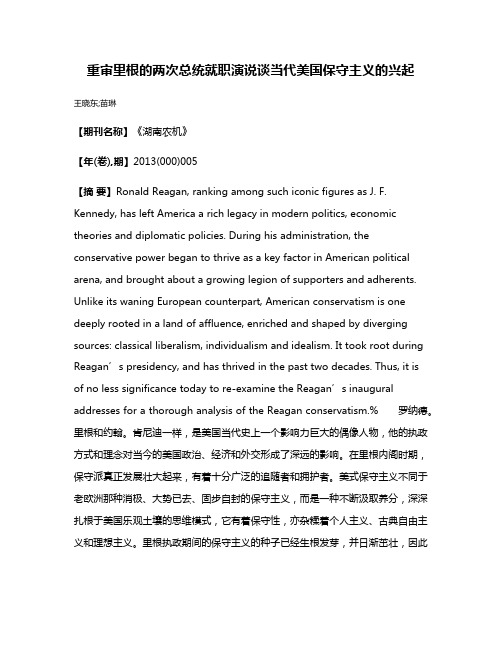
重审里根的两次总统就职演说谈当代美国保守主义的兴起王晓东;苗琳【期刊名称】《湖南农机》【年(卷),期】2013(000)005【摘要】Ronald Reagan, ranking among such iconic figures as J. F. Kennedy, has left America a rich legacy in modern politics, economic theories and diplomatic policies. During his administration, the conservative power began to thrive as a key factor in American political arena, and brought about a growing legion of supporters and adherents. Unlike its waning European counterpart, American conservatism is one deeply rooted in a land of affluence, enriched and shaped by diverging sources: classical liberalism, individualism and idealism. It took root during Reagan’s presidency, and has thrived in the past two decades. Thus, it isof no less significance today to re-examine the Reagan’s inaugural addresses for a thorough analysis of the Reagan conservatism.% 罗纳德。
- 1、下载文档前请自行甄别文档内容的完整性,平台不提供额外的编辑、内容补充、找答案等附加服务。
- 2、"仅部分预览"的文档,不可在线预览部分如存在完整性等问题,可反馈申请退款(可完整预览的文档不适用该条件!)。
- 3、如文档侵犯您的权益,请联系客服反馈,我们会尽快为您处理(人工客服工作时间:9:00-18:30)。
Our two party system has served us well over the years, but never
better than in those times of great challenge when we came
together not as Democrats or Republicans, but as Americans united
13 States. Today we are 60 times as many in a union of 50 States.
We have lighted the world with our inventions, gone to the aid of
mankind wherever in the world there was a cry for help, journeyed
progress when men and women are free to follow their dreams.
And we were right to believe that. Tax rates have been reduced,
inflation cut dramatically, and more people are employed than ever
in a common cause.
Two of our Founding Fathers, a Boston lawyer named Adams and
a Virginia planter named Jefferson, members of that remarkable
group who met in Independence Hall and dared to think they could
there is always a better tomorrow.
Four years ago, I spoke to you of a new beginning and we have
accomplished that. But in another sense, our new beginning is a
our strength toward the ultimate in individual freedom consistent
with an orderly society.
We believed then and now there are no limits to growth and human
Government that properly belonged to States or to local
governments or to the people themselves. We allowed taxes and
inflation to rob us of our earnings and savings and watched the
helped preserve peace in a troubled world; when Americans
courageously supported the struggle for liberty, self government,
and free enterprise throughout the world, and turned the tide of
family and friends, and my fellow citizens:
This day has been made brighter with the presence here of one who,
for a time, has been absent Senator John Stennis.
allow it to have.
That system has never failed us, but, for a time, we failed the
system. We asked things of government that government was not
equipped to give. We yielded authority to the National
American enjoys the fullness of freedom, dignity, and opportunity
as our birthright. It is our birthright as citizens of this great
Republic, and we'll meet this challenge.
President, George Washington, placed his hand upon the Bible, he
stood less than a single day's journey by horseback from raw,
untamed wilderness. There were 4 million Americans in a union of
when our economy was finally freed from government's grip; when
we made sincere efforts at meaningful arms reduction, rebuilding
our defenses, our economy, and developing new technologies, and
start the world over again, left us an important lesson. They had
become political rivals in the Presidential election of 1800. Then
years later, when both were retired, and age had softened their
anger, they began to speak to each other again through letters. A
bond was reestablished between those two who had helped create
this government of ours.
to the Moon and safely returned. So much has changed. And yet
we stand together as we did two centuries ago.
When I took this oath four years ago, I did so in a time of
These will be years when Americans have restored their
confidence and tradition of progress; when our values of faith,
family, work, and neighborhood were restated for a modern age;
economic stress. Voices were raised saying we had to look to our
past for the greatness and glory. But we, the present day
Americans, are not given to looking backward. In this blessed land,
hdarkness and into the warm sunlight
of human freedom.
My fellow citizens, our Nation is poised for greatness. We must do
deserving of your trust.
This is, as Senator Mathias told us, the 50th time that we the
people have celebrated this historic occasion. When the first
continuation of that beginning created two centuries ago when, for
the first time in history, government, the people said, was not our
master, it is our servant; its only power that which we the people
great industrial machine that had made us the most productive
people on Earth slow down and the number of unemployed
increase.
By 1980, we knew it was time to renew our faith, to strive with all
God bless you and welcome back.
There is, however, one who is not with us today: Representative
Gillis Long of Louisiana left us last night. I wonder if we could all
